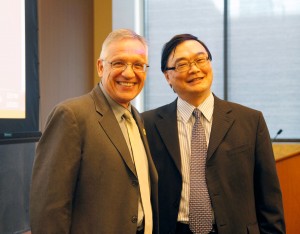iPodia Global program expands distance learning
Through iPodia, students from different cultures and time zones and can come together — in the classroom.
The iPodia classroom, a program through the Viterbi School of Engineering, connects USC students with those from China, Korea, Israel, Germany and other countries.

Global learning · Viterbi Dean Yannis C. Yortsos and Professor Stephen C. Lu joins forces to expand the iPodia Global Program. — Courtesy of the Viterbi School of Engineering
The work coincides with the university’s new partnership with the University of São Paulo in São Paulo, Brazil. A delegation of university deans and trustees led by President C. L. Max Nikias traveled to São Paulo earlier this week to open the university’s eighth international office.
Professor of Industrial and Systems Engineering and iPodia Director Stephen Lu conceived the program when he saw a need to revolutionize the classroom environment. Though, traditionally, students attend lectures and complete homework to understand concepts, in an iPodia classroom, students review the lectures for homework and come to class for interaction and discussion.
“Interaction gives you a good way to learn contextual understanding as well as mutual understanding,” Lu said. “If you have a chance to learn with different people from different countries, you learn in a different context.”
Through the Internet, students are able to learn in the same classroom with professors on the other side of the world. The university will host two online course sessions, with each session involving USC and two other universities.
Session A involves a partnership with Peking University in Beijing and the Korean Institute of Science and Technology in Daejeon, South Korea. Session B will include students from the Technion-Israel Institute of Technology in Haifa, Israel and the RWTH Aachen University in Aachen, Germany.
Lu was inspired to create iPodia by his own time abroad, when he came to the United States as a student 35 years ago.
“I sat in the back. I didn’t speak in class or share my culture because I was so overwhelmed,” Lu said. “The iPodia experience, however, allows students to feel more comfortable sharing their opinions because they are in familiar surroundings.”
Lu said the structure of this learning should not be considered distance learning. Rather, he considers it a method of using technology to eliminate distance and differences between learners.
“You are able to achieve a classroom without borders,” Lu said. “It is the next wave of distance learning. This is a simple idea, but with a huge implication.”
Not only does iPodia use video conferencing in a new way, but it also reconsiders how material is taught. Lu refers to this method of teaching as “inverted learning.”
Kes Rittenberg, a freshman majoring in business administration who spent time with iPodia students in Korea, said he has already felt the impact of learning with international students.
“It was interesting to see how even though we all come from very different backgrounds, we still have some strong undeniable similarities,” Rittenberg said.
The course unfolds in three phases. Students watch the lectures from home discuss the lessons with the class online. Conferencing with international universities will start in phase two, beginning on March 16. The culmination of the semester will take place in Korea at a conference for all iPodia students.
Some students, including Stephen Collins, a senior majoring in electrical engineering, felt the time spent with the Korean students helped them orient themselves with the rest of the class.
“Whether I’m Skyping with a new classmate from Haifa, Israel, or trying to interpret a crazy emoji in our KakaoTalk chatroom from a classmate in Korea, I’m constantly surprised and excited by the interactions I’m able to have,” Collins said.
Lu proposes this as an alternative to global studies and the next step in the university’s globalization efforts.
“Instead of USC going to the world, iPodia brings the world to USC,” Lu said.
